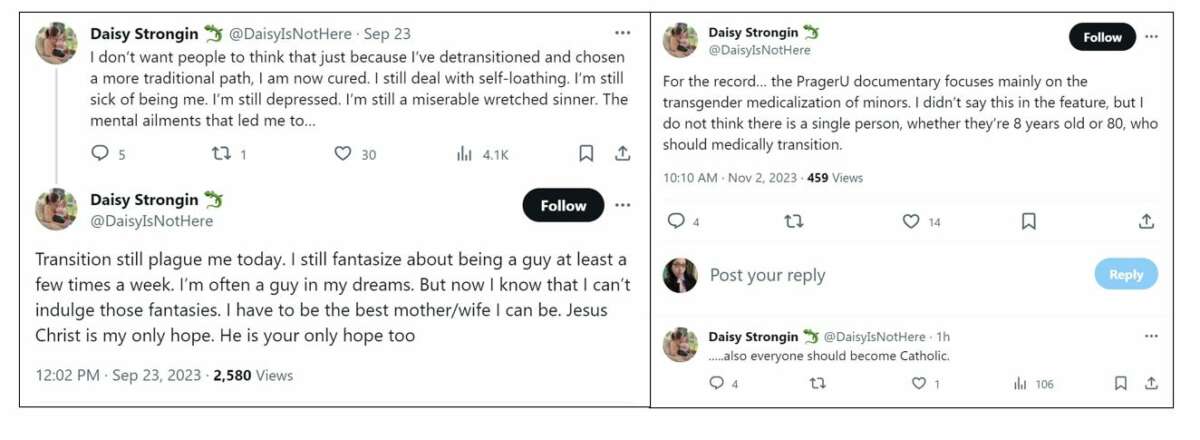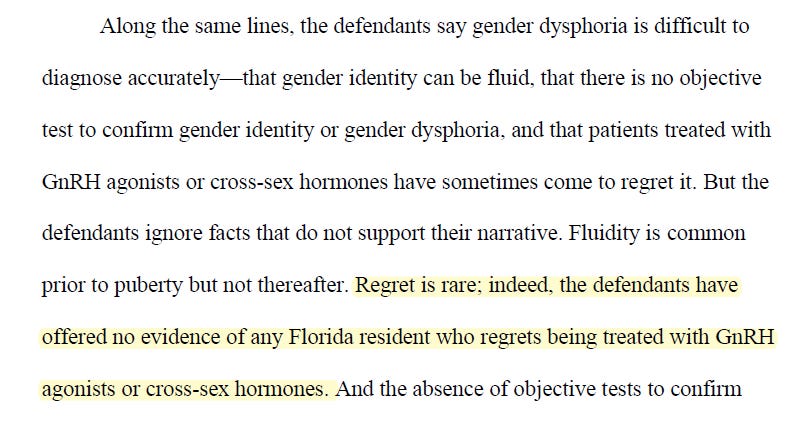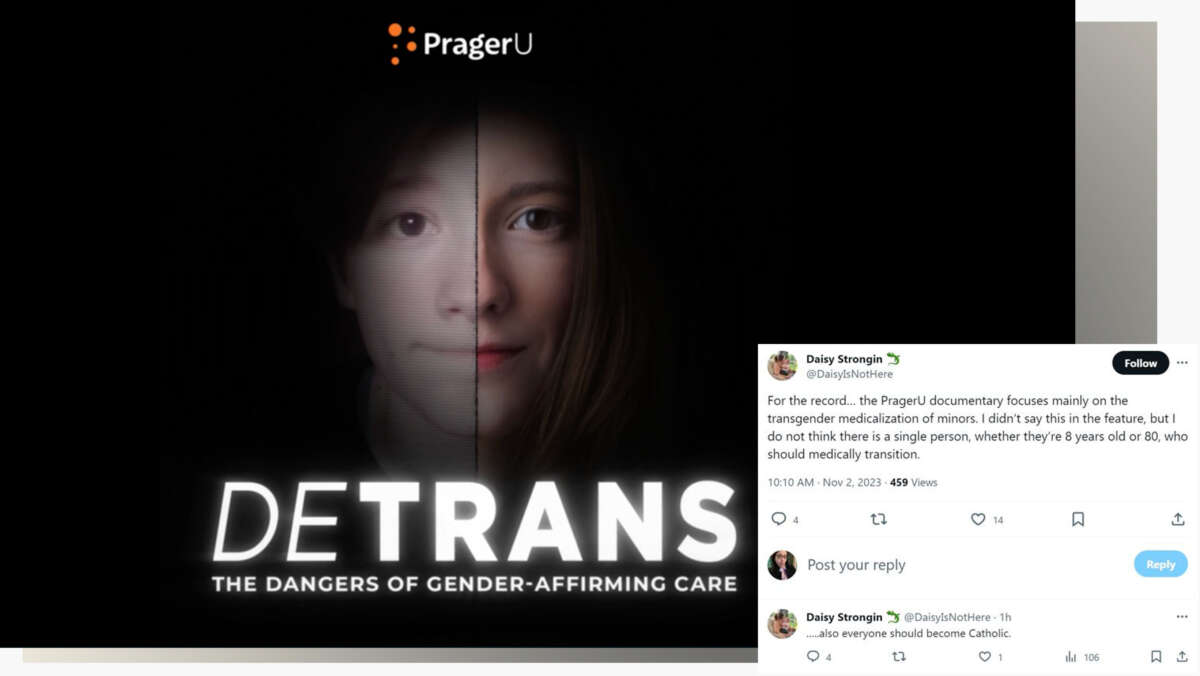On Thursday, a glance at Twitter revealed the hashtag #DETRANS dominating the trending topics section for the full day. Orchestrated by PragerU, this $1,000,000 campaign promoted a short film that brought attention to individuals who have detransitioned, alleging they were “manipulated by the trans movement.” Daisy Stronglin, the main subject of the film, transitioned as an adult at 18 and detransitioned back in 2020, declaring her decision to detransition was “ultimately, for God.” As the day went on and millions watched the film, Daisy made her true position clear in a statement echoing back to the ex-gay movements of the 1990s: Nobody should be allowed to transition at any age, and that everyone should convert to Catholicism.
The ad buy, rejected by Youtube, found approval under Elon Musk’s twitter, who himself has been vocally against gender affirming care, stating that he would lobby to criminalize doctors providing gender affirming care to trans youth. In it, Daisy states that her “mental struggles” led her to transition and that her detransition was caused by her perception that she “never will be” a guy. Not mentioned in the film, however, is that in her announcement video about her detransition, she states that it was done “ultimately for God” after her conversion to Christianity.
The story of Daisy’s platforming to attack transgender people has many echoes of the Ex-Gay movement of the 1990s and early 2000s… a focus on being broken, a search for religious redemption, a framing of LGBTQ+ identities as a “choice” or something people are coerced into, and a story of being “healed.” While the hashtag #DETRANS was trending, Daisy took to twitter to talk about her own detransition and thoughts about gender affirming care. Though she had revealed earlier that she still struggles with gender dysphoria and “fantasizing about being a guy at least a few times a week,” she stated that “Jesus Christ is my only hope.” When she discussed her position on gender affirming care in the wake of the short film’s release, she advocated against gender affirming care for all ages, “8 to 80” years old. She then proclaimed that everyone should become Catholic:

The rhetoric being revived in this campaign harkens back to the arguments against gay marriage advanced by Exodus International, a flagship group in the Ex-Gay movement. A 1993 testimonial from a lesbian woman on the site exemplifies this narrative. She attributed her lesbian identity to insecurities regarding her femininity and professed that her conversion to Christianity marked her departure from homosexuality. Yet, akin to Daisy’s current battles with gender dysphoria, she acknowledged that her “homosexual attractions never went away.”
Now, it is understood that the Ex-Gay movement took advantage of people struggling with religious guilt, using their poor self-worth and issues with societal discrimination to advocate for laws banning sodomy and gay marriage. Many of those who joined the ex-gay movement have since gone back to identifying as gay. The leaders of Exodus International apologized for “Years of undue judgment by the organization and the Christian church as a whole.” The site was then shut down for good.
Despite the best efforts of the political detrans movement, the detransitioner wave has failed to materialize. Regret rates remain incredibly low, with a study finding that among youth, 97.5% of trans youth continue to identify as trans five years later. Most research examining detransition rates shows that they tend to be only 1-3% according to a Cornell University review of the evidence around detransition. In fact, regret tends to be so low that the state of Florida could not find a single detransitioner to argue for a gender affirming care ban in court when defending the state’s anti-trans laws.

As the film concludes, a roll call of other detransitioners is presented. Chloe Cole, whose travels from state to state are funded by contributions from an anti-trans billionaire, is notably featured. Similarly, Prisha Mosely and Camille Kiefel, along with other familiar detransitioners, are showcased. Their frequent cross-state testimonies in anti-trans hearings are strategically used to suggest a burgeoning detransitioner movement. However, to those who observe the same individuals repeatedly testifying and appearing in every conservative documentary on the issue, the underlying reason becomes transparent: the scarcity of detransitioners makes it challenging to recruit anyone else.
The scarcity of detransitioners does not prevent the far right from focusing on them, however. In 2022, a staggering $50 million was funneled into anti-transgender advertisements; however, these campaigns largely did not influence election outcomes. This trend of hefty advertising investments continues into the current year. In Ohio alone, over $3 million was allocated to oppose Issue 1 with ads claiming that amending the state constitution through popular vote was crucial to halt “sex change surgeries on minors.” Chloe Cole was featured prominently in the campaigns against Issue 1. Yet, this narrative did not resonate with the electorate, as Issue 1 was resoundingly defeated. Moreover, a recent exposé by an investigative journalist at HuffPost uncovered that billionaire Joseph Edelman has been channeling millions into organizations such as the Manhattan Institute, Do No Harm, and Parents Defending Education, all organizations that heavily highlight detransitioners.
The future paths of today’s detransitioners remain uncertain — whether they will follow in the footsteps of the ex-gay individuals who ultimately reidentified as gay. A handful of the modern detransitioners have already retransitioned. In the interim, the political detransitioners today will persist as figures championed by those aiming to dismantle gender-affirming care in America.
This piece was republished with permission from Erin In The Morning.
Our most important fundraising appeal of the year
December is the most critical time of year for Truthout, because our nonprofit news is funded almost entirely by individual donations from readers like you. So before you navigate away, we ask that you take just a second to support Truthout with a tax-deductible donation.
This year is a little different. We are up against a far-reaching, wide-scale attack on press freedom coming from the Trump administration. 2025 was a year of frightening censorship, news industry corporate consolidation, and worsening financial conditions for progressive nonprofits across the board.
We can only resist Trump’s agenda by cultivating a strong base of support. The right-wing mediasphere is funded comfortably by billionaire owners and venture capitalist philanthropists. At Truthout, we have you.
We’ve set an ambitious target for our year-end campaign — a goal of $250,000 to keep up our fight against authoritarianism in 2026. Please take a meaningful action in this fight: make a one-time or monthly donation to Truthout before December 31. If you have the means, please dig deep.
